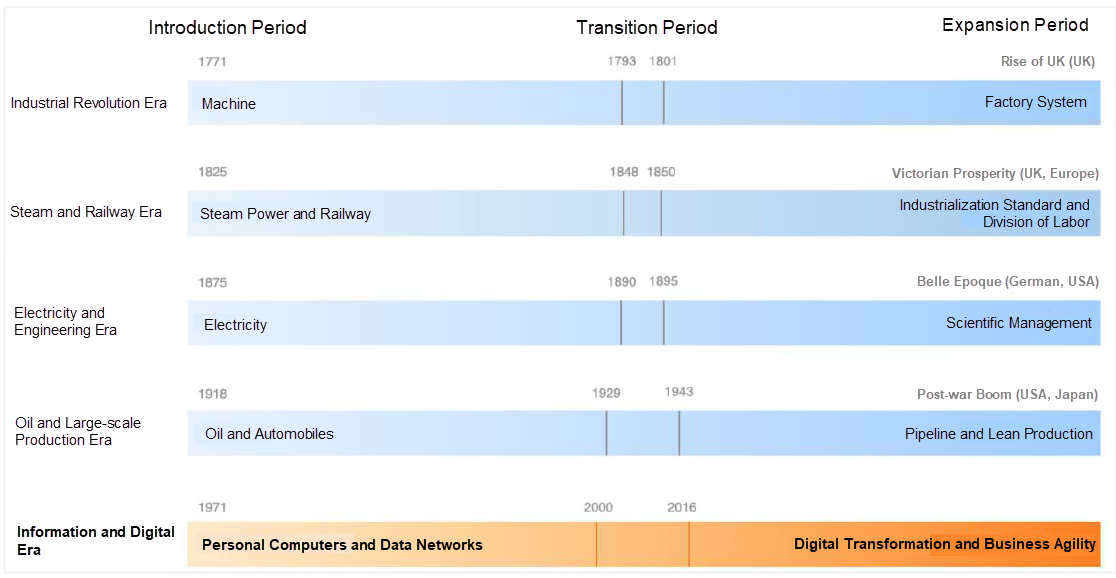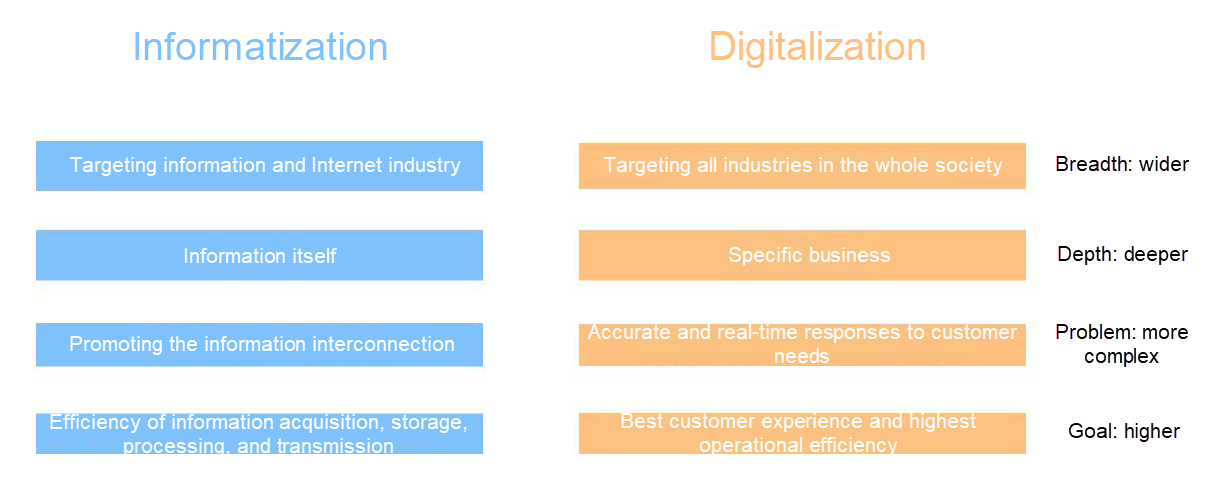This article is from Alibaba DevOps Practice Guide written by Alibaba Cloud Yunxiao Team
In the digital age, technology has become the core of industrial development. The delivery speed and quality of technology are directly related to business development and innovation. Most enterprises emphasize DevOps when planning their digital transformation strategies.
The implementation of DevOps must serve the goal of digital transformation. When implementing DevOps, first, we must understand the expectations and requirements of digital transformation for DevOps.
Digitalization is changing various industries substantially. As far as the breadth and depth of its impact are concerned, there is no doubt that digitalization is a technological revolution.

Five Technological Revolutions since the Industrial Revolution
The book entitled Technological Revolutions and Financial Capital reviews five technological revolutions since the industrial revolution and summarizes the commonalities. Each technological revolution can be roughly divided into three periods: the introduction period, the transition period, and the expansion period.
The introduction period of the digital revolution began in 1971.
The first personal computer and the first microprocessor were born in 1971. ARPANET was born in 1969 and became the prototype of the Internet. The first NATO Software Engineering Conference in 1968 marked the birth of software engineering.
The basic technical elements of digitalization were in place, including the microprocessor, PC, Internet, and software engineering. The following 30 years were the introduction period of the digital revolution. The development of the Internet from scratch improved the acquisition, dissemination, and processing of information worldwide.
Technological change cannot be achieved overnight. It requires an overall upgrade of infrastructure and changes in industry cognition. However, this often brought a low tide to the technological revolution. The Internet bubble in 2000 marked a turning point for the digital revolution.
The turning point affected business development, but technological development did not stagnate. During this period, the cloud, big data, AI, and IoT were developed vigorously, serving as the infrastructure of digitalization. The idea of digitalization deepened and surfaced in various industries.
Today, the industry recognizes that the transition period has ended. 2016 was a landmark year for China when its Internet users exceeded 700 million. For the first time, the Internet population exceeded half of the total human population and could no longer be doubled. It is impossible for the information industry to maintain growth by simply relying on the population credit of the Internet. The digital revolution must develop in-depth and combine with various industries.
Today, the digital revolution is expanding. Its key sign is that digital transformation has become the consensus of all industries. People are not concerned about whether to adopt digitalization but how digitalization combines with specific industries.
2016 was the first year of China's industrial digital transformation. As Ma Yun said at the 2016 Internet Conference in Wuzhen, “In the past 30 years, the Internet has grown from zero to one, and in the next 30 years, the Internet will change from one to zero. The zero means ubiquitous. The boundary between the Internet industry and traditional industries is disappearing.”
Let’s sum up the development of the digital revolution. We are transforming from informatization to digitalization, but what are the differences between informatization and digitalization?
Informatization targets the information and Internet industries, including the information departments of enterprises. It focuses on information and solves the problem of information interconnection. Its ultimate goal is to improve the efficiency of information acquisition, storage, processing, and transmission. As far as this goal is concerned, informatization has done an excellent job.
Digitalization targets all industries in the whole society. It focuses on specific businesses and goes deep into specific business processes. It solves the problem of how to respond to user needs accurately and in real-time. The ultimate goal is to achieve the best customer experience and the highest operational efficiency.

Informatization vs. Digitization
As shown in the preceding figure, digitalization has higher requirements than informatization, with a wider range, deeper depth, more complex problems, and higher goals. This puts higher requirements on IT technology.
The results of digital transformation must also be reflected in business. Digitalization needs to empower business and bring simultaneous improvements to user experience and operation efficiency.
In the era of large-scale production, the contradiction between experience, especially personalized experience, and operational efficiency is inherent. We bring large-scale production and standardized efficiency at the expense of a personalized experience.
Digitalization will have the opportunity to resolve the contradiction between experience and efficiency. It will respond to diversified user needs accurately and in real-time and improve the operation efficiency of the organization to achieve the unity of the best experience and the highest efficiency. We call this ability business agility.

The Goal of Business Agility
Business agility requires an all-around transformation of the organization, such as building a comprehensive, multi-dimensional, and real-time data collection and processing system for the industry. It also includes a rapidly responsive organization in the digital age, integration of online and offline businesses, and upgrade of IT delivery and operation capabilities.
Digital transformation is a systematic transformation. DevOps is an important component of digital transformation. In the digital age, more business innovations and developments can only be achieved through digital technologies. The efficiency of IT technology delivery and operation becomes the key to the success of the digital transformation and is the problem DevOps must solve.
The consumer Internet focuses on the information itself, but industry-oriented digital transformation poses higher challenges.

Business Agility Challenges in the Digital Age
The two changes mentioned above are a huge challenge to the IT technology department, which requires a comprehensive capability upgrade, including organizational and collaborative capabilities and technical and engineering capabilities. Part 3 of this 27-part series describes the two capabilities in detail when talking about the value proposition of Alibaba DevOps.
The core of digital transformation is industrial transformation. China has the most complete industry categories and the largest industry scale worldwide. It is the only country worldwide that has all the industry categories listed in the United Nations industry classification. China has established a strong digital infrastructure with strong policy support and technical talent dividend.
After 40 years of reform and opening-up, China has industrialized rapidly and achieved large-scale manufacturing capabilities. However, digitalization will lead China into an era of large-scale customization to achieve simultaneous improvements in experience and efficiency. We call it business agility. It can drive China from a large industrial country to a powerful industrial country by upgrading China's industrial capacities.
Digital transformation is the combination of information technology and industry. Traditional industries and the information industry (such as Internet companies) need to be transformed. DevOps is an important component of digital transformation, and the systems and practices of DevOps must also serve the needs of digital transformation. This is the common challenge and mission of the Internet and traditional industrial companies.
Why Is BizDevOps an Inevitable Trend of DevOps? - Alibaba DevOps Practice Guide Part 1
The Value Proposition of Alibaba DevOps Implementation - Alibaba DevOps Practice Guide Part 3

1,097 posts | 321 followers
FollowAlibaba Cloud Community - February 6, 2022
Alibaba Cloud Community - February 3, 2022
Alibaba Cloud Community - February 3, 2022
Alibaba Cloud Community - February 8, 2022
Alibaba Clouder - January 4, 2021
Alibaba Cloud Community - February 6, 2022

1,097 posts | 321 followers
Follow Bastionhost
Bastionhost
A unified, efficient, and secure platform that provides cloud-based O&M, access control, and operation audit.
Learn More Managed Service for Grafana
Managed Service for Grafana
Managed Service for Grafana displays a large amount of data in real time to provide an overview of business and O&M monitoring.
Learn More Big Data Consulting for Data Technology Solution
Big Data Consulting for Data Technology Solution
Alibaba Cloud provides big data consulting services to help enterprises leverage advanced data technology.
Learn More Big Data Consulting Services for Retail Solution
Big Data Consulting Services for Retail Solution
Alibaba Cloud experts provide retailers with a lightweight and customized big data consulting service to help you assess your big data maturity and plan your big data journey.
Learn MoreMore Posts by Alibaba Cloud Community
Start building with 50+ products and up to 12 months usage for Elastic Compute Service
Get Started for Free Get Started for Free